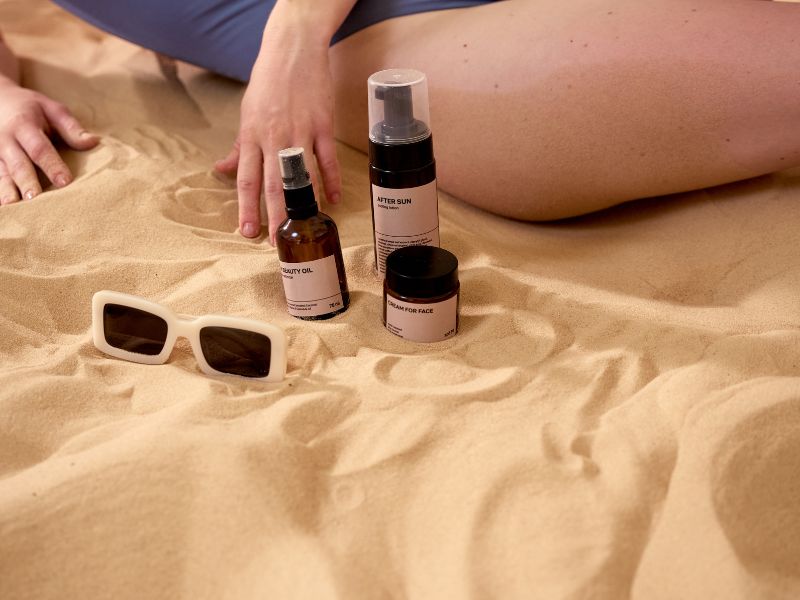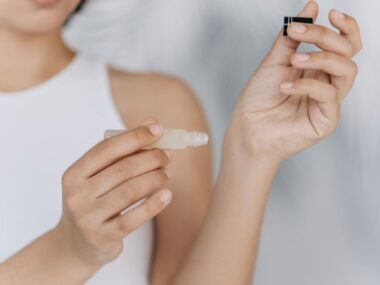Accidentally getting sunscreen in your eyes can be a painful and irritating experience. The sting, burning sensation, and watery eyes that follow can quickly turn a relaxing day at the beach or a sunny outdoor activity into an uncomfortable ordeal. Fortunately, there are effective ways to alleviate the discomfort and get the sunscreen out of your eyes safely. In this article, we will guide you through the steps to follow, preventative measures to avoid future incidents, and additional information about sunscreen safety around the eyes.
How To Get Sunscreen Out Of Eyes
Sunscreen contains chemical ingredients such as oxybenzone, avobenzone, and octinoxate, which are effective at blocking harmful ultraviolet rays from the sun. While these chemicals are great for protecting the skin, they can be extremely irritating to the delicate tissues in the eyes. When sunscreen gets into your eyes, it can cause symptoms like stinging, redness, burning, and excessive tearing. This happens because the eyes have a very sensitive surface known as the cornea, which reacts harshly to foreign substances.
Immediate Steps to Take When Sunscreen Gets in Your Eyes
If you get sunscreen in your eyes, taking quick action is crucial to minimize irritation. Follow these immediate steps:
- Do Not Rub Your Eyes: Rubbing can make the situation worse by spreading the sunscreen deeper into your eyes.
- Rinse Your Eyes with Cool Water: Splash cool, clean water onto your eyes for several minutes. If available, use an eyewash station or sterile saline solution.
- Blink Frequently: As you rinse your eyes, blink repeatedly to help flush the sunscreen out.
- Remove Contact Lenses: If you wear contact lenses, remove them immediately. The lenses can trap sunscreen against the eyes, prolonging irritation.
Using Saline Solution for a More Effective Rinse
If rinsing with water does not provide enough relief, a saline solution may work better. Saline is closer to the natural pH of the eye and can help soothe the burning sensation. Here’s how to use saline effectively:
- Tilt Your Head Back: While standing or sitting upright, tilt your head back and open your eyes wide.
- Apply the Saline Solution: Gently squeeze the saline solution bottle and allow a generous amount to flow over your eyes. Make sure the solution is at room temperature to avoid any added discomfort.
- Repeat the Process: Rinse each eye for at least 5 minutes, and continue blinking to help flush out the sunscreen residue.
When to Use Eye Drops for Sunscreen Irritation
Over-the-counter lubricating eye drops, also known as artificial tears, can help relieve the discomfort after rinsing your eyes. They work by moisturizing and soothing the irritated tissues. Here’s how to use them:
- Select the Right Eye Drops: Use preservative-free artificial tears to avoid additional irritation.
- Follow the Instructions: Apply one or two drops in each eye as directed, usually every few hours.
- Avoid Redness-Reducing Drops: These can worsen irritation in some cases.
When Should You See a Doctor
In most cases, the symptoms will subside after following the above steps. However, medical attention may be necessary if:
- You Still Experience Severe Pain After Rinsing: Persistent burning or stinging that doesn’t improve after rinsing may indicate a more serious issue.
- Your Vision Becomes Blurry or Hazy: While temporary blurriness is common, it should clear up after a few minutes of rinsing. If it doesn’t, see a healthcare professional.
- You Notice Excessive Redness or Swelling: Any prolonged signs of inflammation should be evaluated by a doctor.
Preventing Sunscreen from Getting in Your Eyes
To avoid the unpleasant experience of getting sunscreen in your eyes, consider the following prevention tips:
- Choose a Mineral-Based Sunscreen: Sunscreens with zinc oxide or titanium dioxide as active ingredients are less likely to irritate the eyes.
- Apply Sunscreen Carefully Around the Eyes: Use a gentle touch and avoid the eyelids and the immediate area around the eyes. If you sweat a lot, use a water-resistant sunscreen to help prevent it from running into your eyes.
- Wear Sunglasses: Polarized sunglasses can protect your eyes from both UV rays and accidental sunscreen exposure.
- Use a Sunscreen Stick: These are easier to control during application, minimizing the risk of spreading sunscreen too close to the eyes.
Alternative Products for Eye Protection
If you frequently struggle with sunscreen getting in your eyes, there are alternatives to traditional lotions that may offer a safer option:
- Sunscreen Sticks and Gels: These products are thicker and less likely to run into the eyes when you sweat.
- Eye-Safe Sunscreens: Some sunscreens are specifically formulated for sensitive areas, including the eye area. Look for products labeled as “eye-safe” or “sensitive skin.”
- Moisturizers with SPF: Many facial moisturizers contain SPF and can be used around the eyes with less risk of irritation.
How to Treat Eye Irritation After Sunscreen Exposure
Even after rinsing out the sunscreen, you might still experience some discomfort. Here are a few ways to help your eyes recover:
- Apply a Cold Compress: This can reduce swelling and soothe the burning sensation. Simply wrap a few ice cubes in a clean cloth and place it over your closed eyelids for 5–10 minutes.
- Rest Your Eyes: Avoid staring at screens for long periods, and give your eyes a break to recover from the irritation.
- Stay Hydrated: Drinking plenty of water can help flush any remaining irritants from your system.
Conclusion
Accidentally getting sunscreen in your eyes can be uncomfortable, but it is manageable with quick and proper action. By rinsing your eyes with water or saline solution, using lubricating eye drops, and taking preventive measures, you can minimize the discomfort and avoid future incidents. Understanding which types of sunscreens are safer for the eye area, using alternative products, and following eye-safe application methods can make a significant difference in your overall sunscreen experience.
The next time you apply sunscreen, be mindful of your application technique, especially around the eye area. Always keep a bottle of saline solution or artificial tears handy when spending time outdoors. Being prepared will help you deal with accidental sunscreen exposure to the eyes and ensure a more pleasant day under the sun.
Remember, if symptoms persist or worsen, don’t hesitate to seek professional medical advice. Your eye health is important, and prompt attention can help prevent any serious complications.






